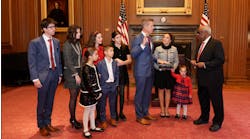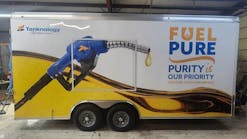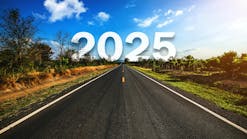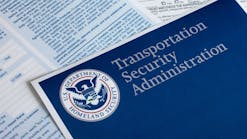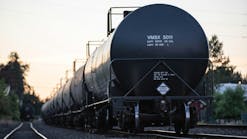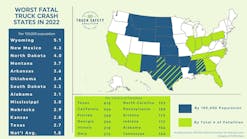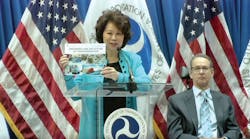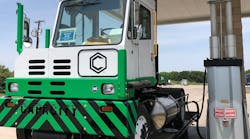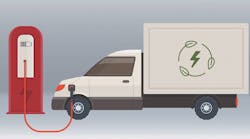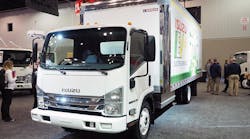The US Department of Transportation (US DOT) recently released new Federal guidance for automated vehicles intended to advance the safe integration of automation into the broad multimodal surface transportation system.
‘Preparing for the Future of Transportation: Automated Vehicles 3.0’ (AV 3.0) builds upon — but does not replace — voluntary guidance provided in ‘Automated Driving Systems 2.0: A Vision for Safety,’ US DOT said.
“The safe integration of automated vehicle technology into our transportation system will increase productivity, facilitate freight movement and create new types of jobs,” said Elaine L. Chao, transportation secretary.
AV 3.0 incorporates the results of extensive stakeholder engagement to provide updated voluntary guidance and policy considerations for a range of industry sectors, including manufacturers and technology developers, infrastructure owners and operators, commercial motor carriers, bus transit, and State and local governments.
American Trucking Associations (ATA) praised US DOT leadership for its rollout of AV 3.0.
“This is a sound and substantive framework that rightly recognizes commercial vehicles are essential to any serious AV policy,” said Chris Spear, ATA president and CEO. “In reaching out to a broad group of stakeholders, the Department should be commended for its thoughtful approach, which will enable an informed decision-making process around new and emerging technologies.
“Thanks to Secretary Chao’s leadership, this guidance ensures that technological progress will not outpace the formation of key safety policy – and will enable America to maintain our role as world leaders both in innovation and in developing this framework. We look forward to working with the Secretary and FMCSA Administrator (Raymond) Martinez as this initiative rolls forward, and to having trucking’s voice as a vital contributor throughout this process.”
US DOT said AV 3.0 supports the safe development of automated vehicle technologies by:
- Providing new multi-modal safety guidance
- Reducing policy uncertainty and clarifying roles
- Outlining a process for working with US DOT as technology evolves
Specifically, the new AV 3.0 guidance provides several updates to the Department’s initiatives relating to automated vehicles, by:
- Stating that the Department will interpret and, consistent with all applicable notice and comment requirements, adapt the definitions of “driver” or “operator” as appropriate to recognize that such terms do not refer exclusively to a human, but may include an automated system.
- Identifying and supporting the development of automation-related voluntary standards developed through organizations and associations, which can be an effective non-regulatory means to advance the integration of automation technologies.
- Affirming that the Department is continuing its work to preserve the ability for transportation safety applications to function in the 5.9 GHz spectrum.
“Automated driving technologies continue to be developed around the country and around the world,” Martinez said at an Oct. 4 event announcing the new policy. “It is not a vision of the distant future, but the reality of the current moment.
“FMCSA is working to facilitate Automated Driving Systems in commercial vehicles by encouraging and supporting innovation that prioritizes safety and reduces roadway crashes.”
AV 3.0 also announces and discusses several upcoming rulemakings and other actions being taken in the near future by the Department’s operating administrations, including:
- The National Highway Traffic Safety Administration (NHTSA) will request public comment on a proposal to streamline and modernize the procedures it will follow when processing and deciding exemption petitions.
- The Federal Motor Carrier Safety Administration (FMCSA) will initiate an Advance Notice of Proposed Rulemaking to address automated vehicles, particularly to identify regulatory gaps, including in the areas of inspection, repair, and maintenance for ADS.
- The Federal Highway Administration (FHWA) announces plans to update the 2009 Manual on Uniform Traffic Control Devices (MUTCD), taking into consideration new connected and automated vehicle technologies.
- The Federal Railroad Administration (FRA) is initiating research to develop and demonstrate a concept of operations, including system requirements, for the use of automated and connected vehicles to improve safety of highway-rail crossings.
- The Maritime Administration (MARAD) and FMCSA are evaluating the regulatory and economic feasibility of using automated truck queueing as a technology solution to truck staging, access, and parking issues at ports.
- The Pipelines and Hazardous Materials Administration (PHMSA) is researching the ability to enable the digital transmission of information to first responders before they arrive at an incident that involves hazardous materials.
- The Federal Transit Administration (FTA) has published a five-year research plan on automating bus transit.
- The draft Guidance will be published in the Federal Register for public review and comment. More information on the Department’s work on automated vehicle systems can be found at www.transportation.gov/av.

